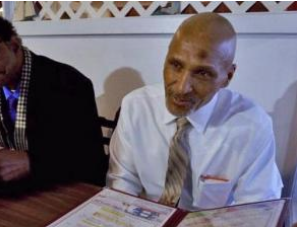
A man who spent nearly four decades behind bars was freed from prison Friday after a three-judge panel found him innocent in the 1976 stabbing deaths of a Bladen County mother and her adult daughter.
Last month, the North Carolina Innocence Inquiry Commission recommended the case of Joseph Sledge for judicial review after newly discovered evidence cast doubt on whether he had anything to do with the killings of Josephine Davis, 74, and Ailene Davis, 53, in their Elizabethtown home.
About an hour after the judges’ ruling – and after 37 years in prison – Sledge, 70, walked out of the Columbus County jail in Whiteville into the arms of family.
“I just thank God to be alive and thank the (North Carolina Center on Actual Innocence) and the Innocence Commission for sticking by this case and making it really happen,” Sledge said.
His next stop: Supper with his family and his attorney 23 miles away at Dale’s Seafood in Lake Waccamaw. He ordered oyster stew and looked at family photos on an iPhone while he waited for his meal.
On Saturday, he’ll return with his family home to Savannah, Ga.
“There’s no question in my mind that part of justice was served today with his release,” said Christine Mumma, Sledge’s attorney and executive director of the North Carolina Center on Actual Innocence. “It’s a tragedy for him to be released after 37 years, at 70-years-old.”
District Attorney Jon David, who was not the original prosecutor in the case, told the judges Friday that he believed in Sledge’s innocence and credited the work of the Innocence Commission for unearthing an “injustice” in the conviction.
David also apologized to Sledge.
“There’s nothing worse for a prosecutor than convicting an innocent person,” he said. “The ‘sorry’ is imperfect to convey the magnitude of what happened with respect to this man’s life.”
David pledged to reopen the investigation into the Davis slayings, but the victims’ family, unconvinced of Sledge’s innocence, expressed disappointment that he would go free.
“We, the family, are heartbroken by this decision,” Josephine Davis’ granddaughter, Katherine Brown, read from a prepared statement. “District Attorney Jon David states that he will be reopening this case, and we, the remaining family members, are shocked by this change.”
Sledge then took the stand.
“I’m very, very sorry for your loss,” he said. “I hope you get closure in this matter.”
At the time of the crimes, a 32-year-old Sledge had been serving a four-year sentence at a prison work farm for larceny when he escaped a day before the slayings. That factored into his conviction, as well as key testimony from two fellow prisoners who said Sledge admitted to the killing the victims when he encountered them while looking for a place to hide after his escape.
One of the inmates recanted his testimony and told the Innocence Commission that he lied in exchange for leniency for a drug violation. The other inmate died in 1991.
Recent DNA testing on hairs found at the crime scene also shows that they could not have been Sledge’s, an expert testified Friday. Testing in the 1970s could only determine that they were from a black male.
In 2003, a judge ordered the hair samples turned over for DNA testing, but it took years of searching before they were found in an envelope on a top shelf in an evidence room in Bladen County.
Sledge is the eighth person exonerated because of the North Carolina Innocence Commission, the only state-run investigative agency of its kind.
The General Assembly created the panel in 2006 to look at post-convictions claims in cases where new evidence supports a defendant’s claims that he or she is innocent of a crime.
Since 2007, the commission has reviewed nearly 1500 claims of innocence.
The nonprofit Innocence Project says there have been 325 post-conviction DNA exonerations in U.S. history.
